6 People We Met In Chatham Tell Us How The Historic Neighborhood Is Changing
By Chicagoist_Guest in News on Aug 30, 2016 5:43PM
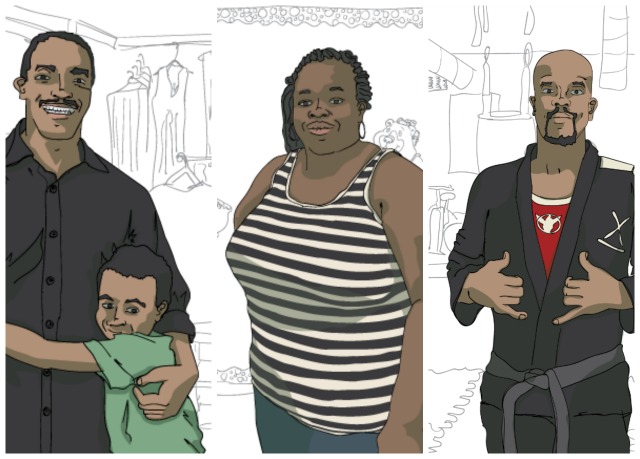
Illustrations by Dan Rowell/Chicagoist
By Adeshina Emmanuel, Bea Malsky and Latricia Polk for City Bureau
Neat lawns and tidy bungalows line quiet residential streets in Chatham, a South Side neighborhood that, in some areas, still looks the part of a black middle class utopia.
Chatham represents the old bastion of black economic mobility in Chicago, where working class folk, political movers and shakers, business people and other professionals have formed the foundation of the tight-knit community since the 1950s. Yet the signs of decline are impossible to ignore, especially on once-thriving business corridors like Cottage Grove and 79th Street that are rife with empty storefronts and the types of businesses you’d expect to see in troubled urban communities: liquor stores, dollar stores, fast food joints, hair salons and payday lenders.
But if Chatham is anything, it is resilient. Despite its ailing local economy and high crime rate, despite the scores of residents and businesses that fled the neighborhood in recent years, the community still has a way of keeping people there—even luring new residents and entrepreneurs who see opportunity where others only see neglect. Though Chatham experiences more crime than some Chicago neighborhoods, it is not one of the city's most-violent communities. Between July 19 and Aug. 18, Chatham saw reports of at least 61 violent crimes, including 2 homicides, and just over 220 property and quality-of-life crimes such as thefts and property damages, according to a Tribune analysis of the city's data portal, making Chatham the 13th-most violent community in Chicago, tied with Chicago Lawn, in the past month.
City Bureau visited Chatham this month to talk to area business owners about the challenges and triumphs of doing business in Chatham, the forces driving change in the community, what Chatham needs to thrive and more. The first part of City Bureau’s Chatham series can be found at Chicago Magazine.
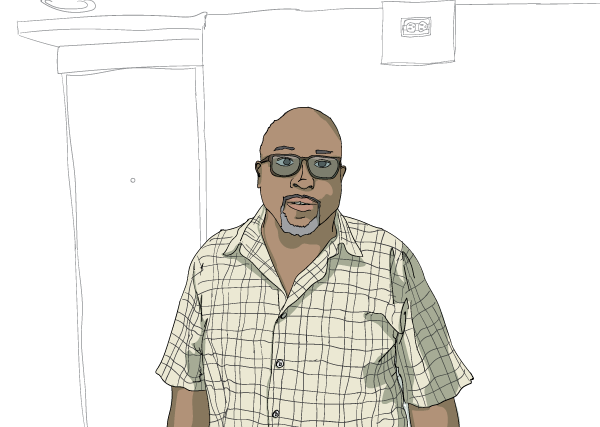
Darryl Townson, illustration by Daniel Rowell/Chicagoist
Darryl Townson
Co-owner of Dat Donut and Uncle John’s Barbecue // 63 years old
On a blistering Thursday afternoon early in July, a slow but steady trickle of customers flock to Dat Donut, 8251 N. Cottage Grove, eyeing the glazed confections behind the counter— including the famous “Dat,” a frosted behemoth bigger than a baby’s head. It’s a diverse slice of the South Side: regal middle-aged women in business suits and heels, testy young parents pushing strollers and marshaling children along, unhurried elders sporting fanny packs and visors, dreadlocked young men whose pants hang just below the butt, burly bus drivers making a pit stop before continuing their route.
Co-owner Darryl Townson has spent most of the day sequestered in his office, cutting checks for his employees at the famous doughnut shop, which he owns with his wife Andrea, along with a rib joint in the same building.
Dat Donut opened about 22 years ago in the building that once housed the popular Leon’s Barbecue. Townson started working for Leon’s founder, Leon Finney Sr., when he was in high school. In 1994 Townson opened Dat Donut in the same space. Finney died in 2008, and Leon’s shuttered two years after that. But in 2010 Townson bought the building and later opened his own rib joint to compliment the doughnut shop.
“Chatham is what I know,” says Townson, who’s worked in Chatham since he was 15. “Chatham is one of your middle-class neighborhoods within the city of Chicago on the South Side that [had] people [with] very close-knit families, people took care of their homes, people tried to stay stable in business based on the economy that was here.”
But Townson says he noticed a change in the area during the 1990s as newcomers moved in after public housing projects like the Robert Taylor Homes were demolished and many of their residents dispersed around the city. The shift brought “a little bit of everything,” he notes, but some of it was bad, namely gang affiliations and crime.
“We do have an influx of young people that don’t seem to be going to school, don’t seem like they are looking for employment,” Townson says. “You do have the seniors that have stayed, but everybody now is getting… pretty scared to go out and do anything in the daytime because of what's going on in the streets.”
But that doesn’t mean Townson wants to take his business elsewhere.
“I have no reason to look anyplace else,” Townson said. “We definitely have the support of the community business-wise, and we don’t just serve the Chatham area, people come from all over for Dat Donut...I’m not looking to leave.”
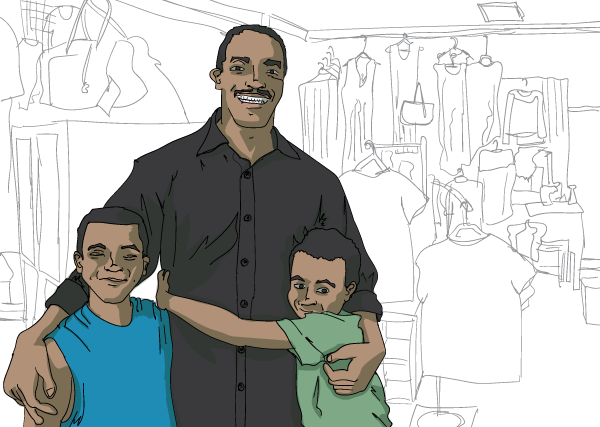
Michael Muhammad, illustration by Dan Rowell/Chicagoist
Michael Muhammad
Co-owner of the Uniform Store // 39 years old
Michael Muhammad is one of four owners of the Uniform store, a small store at the corner of 79th street and Eberhart Avenue. He says he has witnessed scores of Chatham small businesses fail in the past five years.
“It is a revolving door for a lot of businesses, because small business owners start off with a lot of hope," he says, but don't succeed due to a lack of support. “Many young women have been opening up boutiques. But once their boutique opens, they do not have a lot of people walking into their stores.”
In comparison, he says, “When Family Dollar opened, they had a lot of people standing outside waiting on them to open, and the same thing with Food-4-Less and many other commercial businesses. But for us small black businesses or independent businesses, we have to work for our customers.”
Muhammad wants black people to come together and pool resources to take advantage of business opportunities in the area, something he says “our Mexican, Vietnamese, and our Arab brothers and sisters” do when they start businesses.
“They leave their communities and come to a place that they know the fabric of the economic cloth is dead, they know we are not producing the way we should,” Muhammad says. “They’re unified and they benefit from our disunity. They come to our neighborhoods and take advantage of a business opportunity. We have to unify, that’s the only way.”
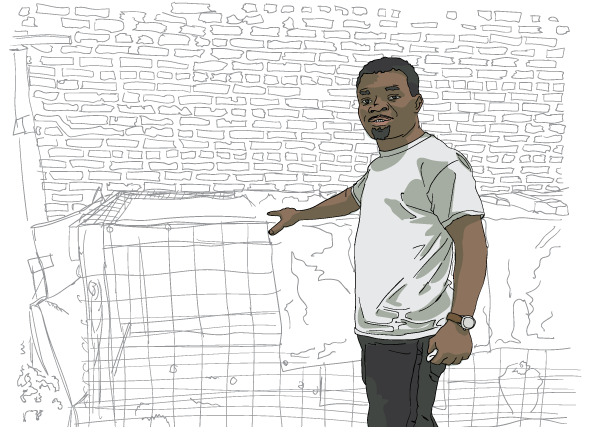
Artemus Gaye, illustration by Dan Rowell/Chicagoist
Artemus Gaye
President and founder of The Prince Ibrahima and Isabella Freedom Foundation // 40 years old
About five years ago, Liberian native Artemus Gaye moved from an apartment in Rogers Park on the Far North Side to Chatham.
“I came here on the South Side mainly because of space,” says Gaye, who runs a shipping business out of his home. “I thought, ‘Educated black folks, why should they go to the suburbs?’ ... Could I find an area within the South Side that I can be comfortable and build as a community?”
Gaye lives in a five-room bungalow with his parents and daughter just west of Cottage Grove, on a quiet block where signs at each corner command passersby to keep their voices down. For security he keeps a pair of pit bulls in his backyard, which also houses a chicken coop that provides his family with a daily serving of fresh eggs.
Gaye, a scholar who holds a Ph.D. in Christian ethics from Loyola University Chicago, is a descendant of a West African prince named Abdul Rahman Ibrahima who endured 40 years of slavery in the U.S. before he was freed. Gaye’s home-based shipping business, named after the prince and his wife Isabella, caters to West Africans in Chicago who want to send things—“food, medicine, clothes, cars, anything”—back home.
Gaye has seen Chatham residents forced to leave their childhood homes when they can’t afford to maintain the houses their parents bought. Gaye, on the other hand, says he wants to hang around to make the community a better place. He’s looking to work on neighborhood projects with community groups and churches. Among those ideas: transforming a vacant lot on King Drive given to him by the city into a multi-purpose space for indoor soccer, dance classes and gardening.
“Until there's ownership from the grassroots, we won't have a better sense of security,” Gaye says. “The security here is not just about policing, but about the economic and the social; it's for our cultural and spiritual benefit.”
Gaye says he has tried to encourage fellow Africans living on the North Side to see Chatham as an opportunity to establish an African immigrant community by buying property, homes and businesses in the area. He’s encountered resistance.
“Africans for the most part have this fear of the city—of the South Side,” Gaye says. “I'm trying to break that, that's why I'm encouraging them! We're all concentrated in the Rogers Park area, for the most part, and Uptown. So you have a large Nigerian population, Ghanaian population, there. And then we have most people who tend to get very successful move to the suburbs.”
Gaye is resolute that Africans should be congregating in Chicago’s black middle-class neighborhoods.
“This is historic, to be in this kind of area,” Gaye says. “To be educated and invest time in our community—we can do that.”
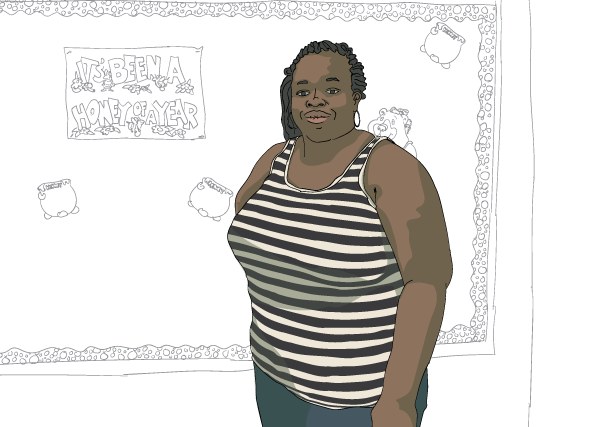
Ebony Mosley, illustration by Dan Rowell/Chicagoist
Ebony Mosley
Owner of The World Is Your's Childcare & Learning Center // 38 years old
The facade of Ebony Mosley’s daycare is a flash of color, a broad yellow awning with a red picket fence and several cheery painted cartoon animals. Mosley has operated the center at 8026 S. Cottage Grove Ave. for the last decade, teaching and tending kids ages two to twelve from 6 a.m. to 6 p.m.
Mosley attends the nearby New Life Covenant Church on 78th Street, but lives in the suburbs and has no plans to move to Chatham. She notes families moving into the neighborhood and quickly deciding to leave, and hopes to see new programs to counteract a dearth of job opportunities for Chatham’s teenagers.
“We need activities,” she says. “There's too much hanging out on 79th, that's why there's always something happening. They need more youth programs or youth centers, somewhere that these children can go to keep them from being outside getting hurt.”
She adds, “If more businesses were opening, there'd be better opportunities for them to find employment and help them stay off the streets.”
Mosley has an intimate window into others’ family lives, a responsibility she takes seriously. Because life can be rough for kids at home, she says, “I make sure they feel like they have somewhere to go or some kind of safe environment that they can come to.”
“There's a lot that I've seen in the last ten years that I've been here,” Mosley says. “Different things with children and their families, parents, mothers, boyfriends, husbands. Domestic violence, all sorts of different things. I'm always here to listen to them, be an ear, comb some of the kids' hair, I cut the boys' [hair], I buy them coats and clothes and hats and gloves, scarves, shoes—whatever I can do to help them, I just do it.
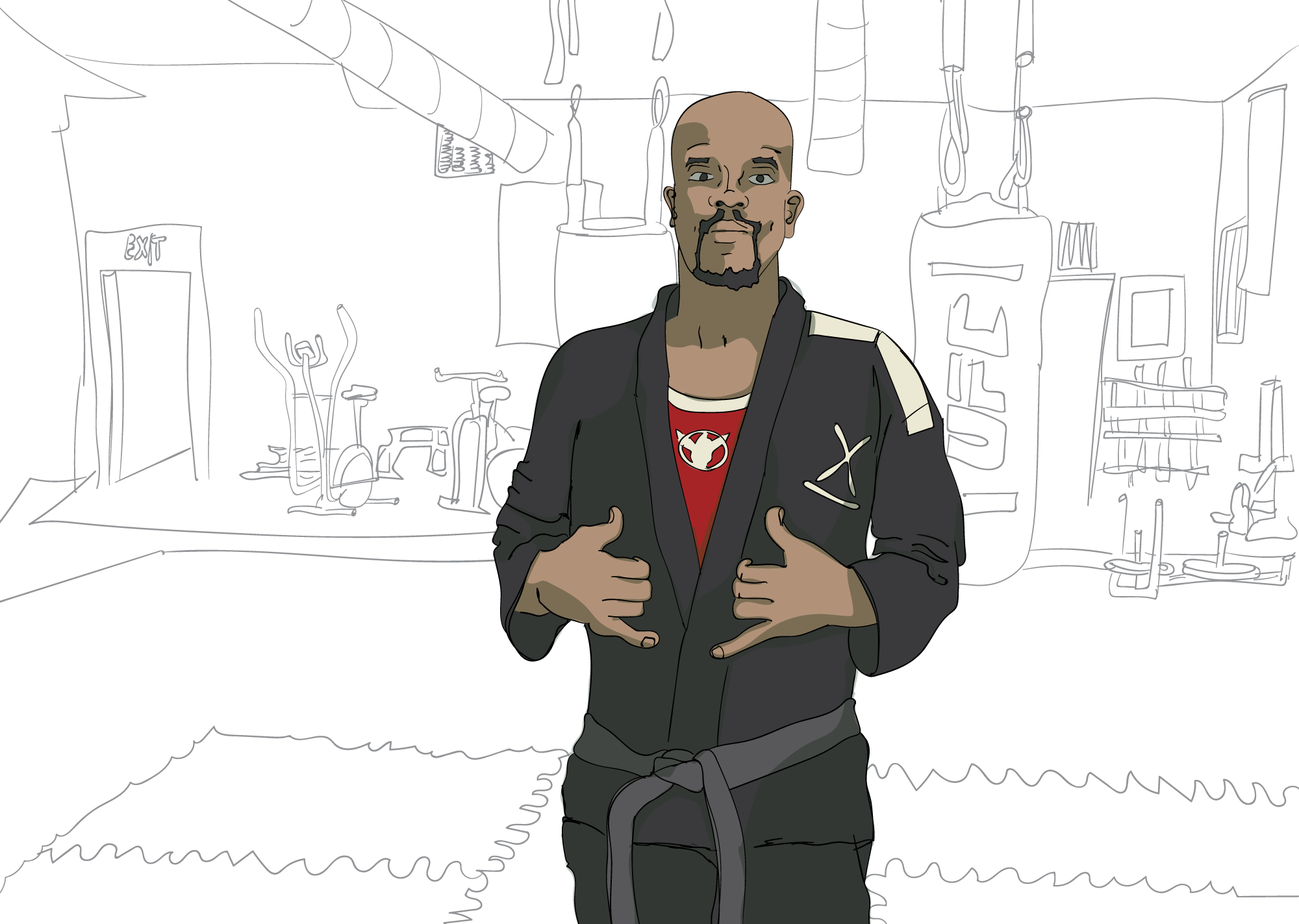
Stephen Kinison, illustration via Dan Rowell/Chicagoist
Stephen Kinison
Co-owner of CombatZone Fitness // 40 years old
Stephen Kinison is a personal trainer who lives in Edgewater and owns a martial arts studio in Chatham, right across the street from Dat Donut. He says the studio at has 200 members from 5-year-olds to people in their early 70s.
“We have an actual interaction and a relationship, and get a chance to see the children and the adults develop long term,” Kinison says, describing his relationship with the Chatham community. “You know, building a family and not just a consumer...I feel like I’m interacting and not just selling something; I’m giving something back.
He says he was aware of stigma the area faces, but given that there are businesses on Cottage Grove, he figured somebody was making money and maybe he could, too.
“I was kind of skeptical at first but now I can see it,” Kinison says. “It’s good people here and they love to see this [business]...You don’t have to go outside your community to find what you’re looking for. I have faith that we will continue to grow, and that’s pretty good for an area like this.
In an area rife with liquor stores, unhealthy food and crime, Kinison says a business like his is much-needed in Chatham.
“I feel like to be successful in martial art you have to have that balanced [way] of thinking right, eating right,” Kinison says.
Kinison says struggling property values and concerns over crime have convinced many homeowners that they should cash out “while they can and...move somewhere they feel is on the uprise.”
“I think this area is right on the fence,” Kinison says. “With a little bit more of community support it can be that middle-class area.”
Kinison emphasized that the fact that he's a black business owner matters to people in the area.
"I think it does, I think the neighborhood appreciated [that,]” Kinison says. “I got a lot of positive support from parents, children, and other business owners. I feel like they are surprised to see it.”
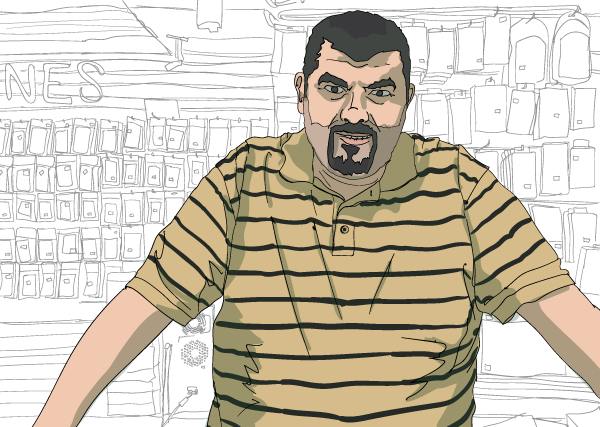
Anthony Hamdan, illustration by Dan Rowell/Chicagoist
Anthony Hamdan
Co-owner of ABC Cellular // 46 years old
Anthony Hamdan commutes from suburban Burbank to manage one of his brother Omar’s three stores, a dollar store and two cell phone stores in Chatham. He’s been working in neighborhood for 16 years. Hamdan manages ABC Cellular, at 804 E. 79th St., and he says Chatham is a good community that lacks safety.
“We hear it from customers: they stole my phone, and they stuck me up with a gun,” Hamdan says. “A lot of them come in because they got their phones stolen and you hear that almost every day.”
He remembers a time when there used to be more police in the area, but says their presence has decreased. “They used to walk [around] a lot and come in here, but lately they cut them down,” says Hamdan.
Hamdan’s store has not experienced any crime in Chatham, but he says that a few years ago his brother Omar’s dollar store’s air conditioner compressor was stolen and the same happened to the restaurant next door. “They took the whole compressor,” he says.
Hamdan says he’s not involved in local politics in Chatham, but two weeks ago his brother went to the community police meeting. As for his personal safety, he says he feels safe walking around in the community because he has been working in Chatham since 2000: “I’ve been here for a long time. I know everybody, almost.”
This piece was produced by City Bureau.
About the illustrator: Daniel Rowell is a writer and illustrator based in Chicago. You can follow him @danieljrowell.